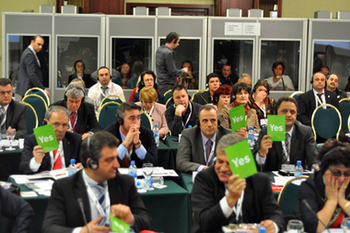Network of Associations of Local Authorities of South-East Europe (NALAS)
Project description
Title: Network of Associations of Local Authorities of South-East Europe (NALAS)
Commissioned by: German Federal Ministry for Economic Cooperation and Development (BMZ)
Country: Albania, Bosnia and Herzegovina, Bulgaria, Kosovo, Croatia, Macedonia, Moldova, Montenegro, Romania, Serbia, Slovenia, Turkey
Lead executing agency: Network of Associations of Local Authorities of South-East Europe (NALAS)
Overall term: 2010 to 2015
Context
Local self-government is still a new topic in South-East Europe. As the Western Balkan states move towards decentralisation, they face common challenges in strengthening local democracy and satisfying the requirements for bringing them closer to the EU. The challenges exist at various levels: making local authorities more responsive to the needs of citizens, improving the municipalities’ legal competencies and financial resources, and building capacities in the local government associations so that they can offer their members tailored advice and promote their interests when dealing with central government.
The Network of Associations of Local Authorities in South-East Europe (NALAS) was founded in 2001 in response to these challenges and with the aim of promoting peace and stability. The network has the task of promoting regional cooperation between 16 local authority associations from the countries in the region, and developing their competencies, resources and institutional capacities for further decentralisation. It also helps local authorities and their associations with advocacy and lobbying.
Objective
NALAS has developed into a sustainable network that effectively promotes municipal development in the home countries of its member associations.
Approach
The programme is closely geared to the current NALAS strategy, its objectives and areas of activity:
- strengthening the member associations in the context of decentralisation in the countries of the region
- promoting the interests of local authorities in South-East Europe within the European Union and the Council of Europe
- institutional and financial sustainability of NALAS
- strengthening local self-government and the provision of citizen-focused services.
The programme supports NALAS by deploying regional and international experts. Task forces facilitate collaborative learning by analysing best practices from the region and making them available to the associations. The associations are able to approach the network with enquiries about municipal policy, and receive responses from the member associations within one week (Quick Response Programme). Direct exchange between individual associations is enabled through exchange visits (Shadowing Programme).
New cooperative projects and greater visibility enhance NALAS’ international position and make it a reliable and respected partner, within the region and beyond.
As an institution, NALAS is a well-established network. The experts help to create efficient structures for cooperation, to develop and implement NALAS’ strategy, and to adapt processes so that information and knowledge can be accessed and disseminated more effectively. Furthermore, as a network of associations from 12 different countries, NALAS’ political dimension must also be taken into account and its potential tapped. The programme is developing several strategic options in cooperation with NALAS to ensure its financial sustainability.
From 2011 to 2013 the programme was implemented by the consulting firm PEM GmbH in Düsseldorf.
Results
NALAS has six thematic task forces dedicated to urban planning, fiscal decentralisation, energy efficiency, sustainable tourism, organisational development and solid waste and water management. This has enabled the network to expand cooperation and exchange of knowledge between its member associations, and to put together several publications and make them available on the NALAS website and elsewhere. The Quick Response and Shadowing Programmes have developed into established instruments and are in great demand.
NALAS has strengthened its international position. On behalf of the Regional Cooperation Council (RCC), it now coordinates activities intended to promote good governance as part of the new SEE 2020 regional strategy. International visibility has been enhanced by the municipal fair NEXPO. The first NEXPO was held in Sarajevo in 2011. With more than 2,000 visitors and numerous working groups at the fair, cohesion grew between local government actors in the region. NEXPO 2013 in Rijeka and Opatija also provided an opportunity for local authorities and private industry to engage in direct dialogue on development projects.

New planning tools and administrative procedures have been introduced, and best practices from the member associations have been shared with municipalities in the region. The task forces are helping build local authority capacities through their work in areas such as involving local people in service delivery and improving the negotiating positions of local government associations vis-à-vis central government. With the ‘Sofia Declaration on Enforcing the political neutrality and independence of Local Government Associations’ (of 2010) and the joint declaration entitled ‘Local Governments Facing the Future’, NALAS and its members are continuing to successfully promote local democracy and decentralisation.